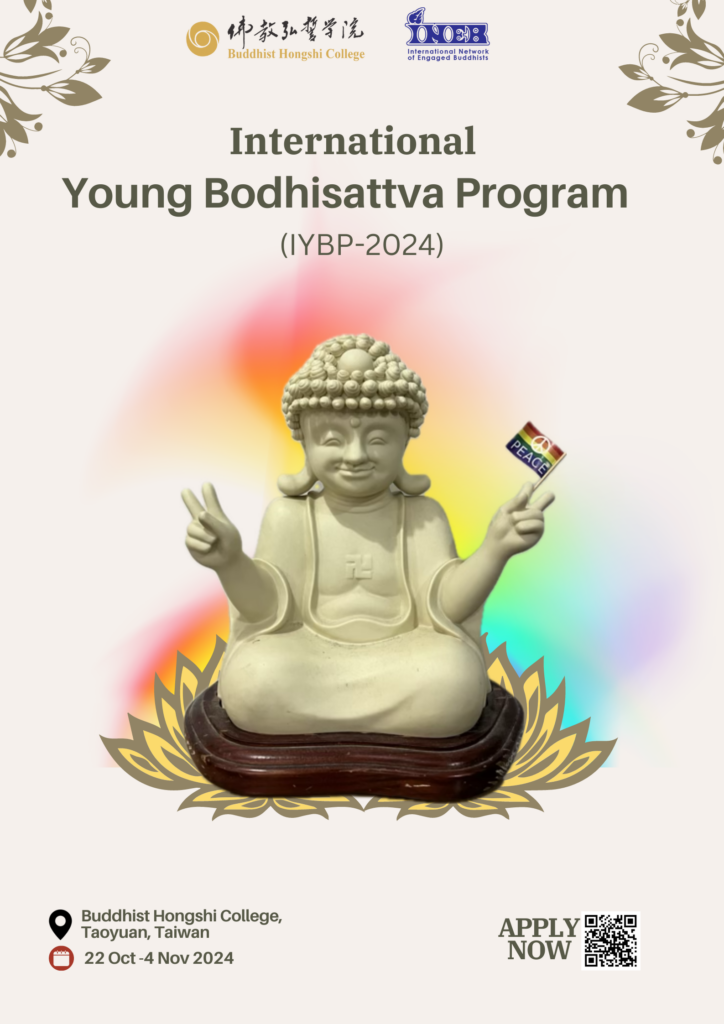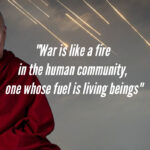
International Young Bodhisattva Program:
For Spiritual Resurgence & Social Transformation
22 October – 4 November 2024
Buddhist Hongshi College, Taoyuan, Taiwan
A collaboration of Buddhist Hongshi College
& the International Network of Engaged Buddhists (INEB)
The Crises Facing Our World
A common phenomenon that can be observed in the countries where members of the
International Network of Engaged Buddhists (INEB) bodhisattvas have been operating,
especially in South and Southeast Asia, is that the people have not yet achieved enduring peace
and social justice. Every country continues to be influenced by capitalism and authoritarianism
from the colonial era until the recent era of globalization. The common experience shared by
the Third World countries is dominated by the business corporate sector (transnational and
national corporations, IMF, World Bank, ADB, WTO, etc.) and the non-democratic or pseudo-
democratic governments. These two sectors’ powerful influence adversely impacts everyone.
As humans, we have become increasingly aware that the predominant threat to the planet is
the ecological price of human consumption and lifestyle. Former values such as simplicity,
sufficiency and sharing within the community have gone by the wayside or minimised as they
are fueled by a capitalistic ideology that relies on mass production to maximize profit.
This change has increased greed-based values such as selfishness, competition, oppression,
and exploitation among humans and against nature. These conditions make achieving real
peace in any context difficult. Instead, structural violence and injustice have created conditions
of poverty, ecological crisis, hunger, human rights violations, discrimination and conflicts at
many levels.
When material development becomes both the overarching personal and national goal, it
overshadows values such as compassion, simplicity, forming relationships, sharing, and
forgiveness. The degradation of the human spirit is, in fact, due to many factors. Firstly, it
becomes more difficult for people to resist the temptations of indulgence, wealth and fame that
the modern world presents to them. In addition, people become victims— forced to struggle
and survive in violent, corrupted and unjust social structures. We can see those forces also
eroding many societies’ traditions.
The future of humankind relies on its young generation. However, growing up in divided
societies makes it very difficult for them to realise their potential and positively contribute to
society. A great deal of young people’s vitality is expended because of the impact of structural
violence, namely—poverty, ill health and many other social and economic inequities in
education, housing, employment, and so forth. These conditions create disparities and
instability, particularly in communities where development is imbalanced.
What Can Buddhist Thinkers and Social Activists Do?
Some Buddhist thinkers and social activists have proposed alternative views and practices to
create societies based on compassion and non-violence, which are key Buddhist values. These
are intended to reverse the negative outcomes brought about by the development route that
Third World countries have taken.What the Buddha set forth more than 2,500 years ago was a means of discovering truth/dharma. These truths, passed down to us through the ages, transcend time and remain relevant today.
In modern times, the Buddhas’ teachings are being applied across Asia—via many means—to
achieve social justice and equity. The Dhammic socialism by Bhikkhu Buddhadasa, Meritism
(as opposed to capitalism) by the Asoke Network, Ajaan Sulak Sivaraksa’s teachings on critical
thinking, and discourses on Gross National Happiness are just a few examples. Other
experiments include the Samdrup Jonghkar Initiative (inspired by Buddhist teachers such as
Dzongsar Khyentse Rinpoche), Buddhist models of leadership and governance (as seen in the
model of His Holiness the Dalai Lama and Samdhong Rinpoche), as well as peace and ecological
actions by many Buddhist movements of the Karmapa and Thich Nhat Hanh. There are quite
strong and substantial movements of socially engaged Buddhism becoming internationally
renowned, even beyond Asia.
As the struggle for genuine peace and social justice continues, we cannot underestimate the
importance of youth in these movements. As youth (Buddhist and otherwise) realize their
human potential to contribute to deep and lasting social change, the timeless teachings of the
Buddha have great potential to serve as road maps for a peaceful and sustainable world.
The International Young Bodhisattva Program
The International Young Bodhisattva Program (22 October – 4 November 2024) established by
INEB, in conjunction with Buddhist Hongshi College, aims to develop young people’s
confidence, capacity, and commitment to social and spiritual transformation. It is an exposure
program for youth to learn about social engagement—centered on values of loving, kindness
and compassion—in Asia, particularly in the context of Taiwan.
Who Would Benefit From This Program?
Whether you were born in a Buddhist family, came to Buddhism on your own, or do not
identify as a Buddhist at all, this program is designed to strengthen your understanding of the
roots of “dukkha” or “suffering’ in our modern societies, as well as potential ways to address
them.
Applicants should:
-Possess strong English language capacity.
-Be 20-40 years of age.
-Demonstrate interest in Buddhism/spirituality/personal & societal
transformation/social engagement & change.
-Open to learning with others.
-Possess special skills such as leading activities, and making videos, and presentations.
What Will You Learn from Taiwan & this Program?
The content is based on a three-mode learning process involving intellectual, spiritual and
physical practice. Sessions will include panels, discussions, community-building activities,
meditation practice, as well site visits to understand opportunities and challenges for social
engagement in Taiwan and the role played by Buddhists and other activists.
Participants will learn from the teachings of the Buddha Dharma’s Four Noble Truths to
develop an analysis of societal structures and institutional sources of power and use various
tools to critically examine and investigate conditions in their lives and communities.
Participants will also build connections and a network of kalyanamitta (comprised of other
youth and elders, teachers, and resource people) from across Asia and other parts of the world.
Participants will also visit a select number of civil society organizations, government agencies,
and Buddhist institutions in Taiwan that demonstrate how the island offers examples of
pioneering work on the environment, gender and sexuality, democracy and free speech, and
chaplaincy and palliative care. Finally, participants will be asked to conduct mapping exercises on social engagement in their countries and create action plans to consider what contributions they can bring home and how they can foster future leadership in their communities.
Tentative Content
- What is Engaged Buddhism
- Buddhist Health & Exercise
- Site Visit on Civil Society & Government Action (e.g., LGBTQ rights & environmental
- issues)
- Join Taiwan Pride 2024
- Analysis of “Social Dukkha” and Power & Structural Inequality
- Meditation & Nature Retreat
- Suicide Prevention: Role of Buddhists in Taiwan & Japan
- End of Life Care: Role of Buddhists in Taiwan & Japan
- The Opportunities and Risks of Media & Big Data
- Site Visit to Tzu Chi: Buddhist Role in Healthcare & Waste Management
- Requirements for Selected Participants
- Cover own airfare (costs of room, board, and programming covered by Hongshi)
- Full, active attendance, including in the pre-departure briefing
- Two presentations
To prepare before arrival: Introduction to your work and/or country context
(only 5 min)
To prepare during the program: Final creative presentation about what being a
bodhisattva means to you and how you can nurture more bodhisattvas in your
country (5 min). To be accompanied by a 1-page written report.
Examples include: social media campaigns, photostory, videos, theatre,
poems, songs, podcast
On Completion of this Program, Participants Will:
- Possess a wider understanding of Taiwan and of the potential for engaged Buddhism.
- Identify ways to bring Bodhisattva intent and motivation into their communities.
- Initiate plans to develop future leaders in their lives.
- Develop foundational tools and frameworks to analyze social structures and address
- dukkha on the personal and societal levels.
- Build a network of companions and teachers with shared values to support them in
- their goals.
- Gain more confidence in their naturally inquisitive heart-minds.
- Demonstrate a greater ability to critically think about and question structures that
- impede the development of Bodhicitta.
Program Timeline
Application Deadline – 31st May 2024
Announce Shortlist – 15th June 2024
Interview – 20th –30th June 2024
Notify Selected Participants – 5th July 2024
Confirm by Selected Participants – 10th July 2024
Run Visa Process – 20th July 2024
Send Logistics Information – 30th September 2024
Online Orientation – 15th October 2024
Arrival at Hongshi College – 22 nd October 2024 (plan to arrive by 5 pm)
Program Ends – 4th November (plan to depart after 12 pm)
Apply now! Application Link

Application Link






